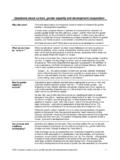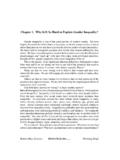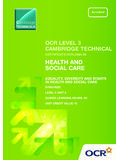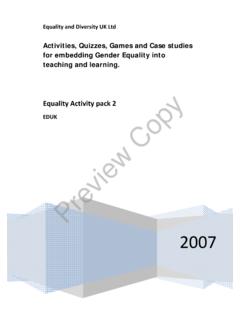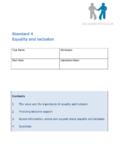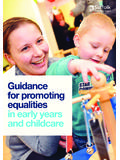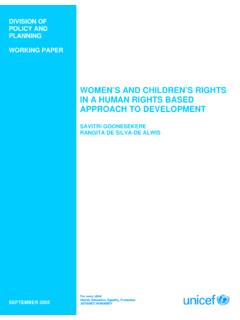Transcription of Guide to Fairness in Recruitment & Selection - …
1 equality Ethics Excellence Guide to Fairness in Recruitment & Selection - Interviews Fairness in Interviewing (Excerpts). There is now considerable research to show that the interview can be a notoriously unreliable method of assessing the suitability of applicants. It is known that aspects of an applicant's identity such as their ethnicity, gender identity, any disability, age and their sex may differentially shape the expectations and behaviour of the interviewer and the outcome of the interview . Discrimination might not necessarily be the result of overt prejudice on the part of the interviewer, but might be due to the informality of the interview or the reliance on inexplicit criteria and subjective judgements. When writing to candidates ensure that you convey a positive message about why they have been short-listed, stressing that they have been selected because they have demonstrated so far the skills and attributes your organisation is looking for.
2 Ensure that the job description and person specification and no extraneous factors - provide the framework for the interview and assessment process Include a minimum of two interviewers and assessors, both men and women, and as diverse a mix of characteristics and levels of seniority as possible. Research suggests that Fairness may be increased by greater diversity in the assessor group. Before interviews begin, make sure assessors have discussed and agreed the interview /assessment centre schedule and the guidelines for scoring and decision- making. Draw up and agree the list of interview questions before the interviews Cover the same areas with all candidates in order to ensure comparability between interview responses. Do not vary the complexity of questions between candidates. Check venue and timing for interviews and assessments, providing a range of options for timing where possible, in order to ensure people are not unnecessarily prevented from attending interviews only late in the day during Ramadan; inaccessible venues etc.
3 interview Questions Questioning in Selection interviews is a specific skill. Considerable care needs to be taken in the formulation of interview questions to ensure that they will elicit valid and reliable information for the assessment of applicants with diverse backgrounds and abilities. The form of the question affects the answer given and interviewers should ensure that any Page 1. differences between applicants in the quality of the answers are not merely a reflection of differences in the clarity or nature of the questions asked. equality Academy Ltd. October 2013. equality Ethics Excellence While taking care to maintain objectivity and consistency, interviewers need to be sensitive to the individual differences in applicants' styles or presenting themselves and their familiarity with or self-confidence in the social environment of the organisation. Ask candidates a carefully prepared question based on person spec criteria - about their understanding of diversity in the workplace and how they put that into practice.
4 Use prompt questions to establish their depth of understanding and likely behaviours in real life situations. NB Interviewers must themselves have a proper appreciation of these issues and be sufficiently skilled to distinguish poor, competent and excellent responses to these questions. Where a job involves necessary unsocial or irregular hours, present the same full facts to all interviewees. Do not make assumptions about whether candidates can meet requirements women are less likely to be able to cope with anti-social working hours'. Ask all candidates whether they have understood the requirements and will be able to meet them if appointed. Do not discourage any candidate by stressing the disadvantages of the job. Questions to avoid Do not ask: What is your marital status/religion/sexual orientation/ethnicity? Where do you/your parents come from? Can you manage this job at your age?
5 Do you think you will fit in'? Will your religion/belief be a problem? Are you planning to get married? What are your plans for a family/ how old are your children? What does your spouse do? What arrangements will you make for your family if you have to work away from home? Do you think that you will be able to deal with difficult male clients? How well do you understand British culture or customs? Or How fluent is your English? (unless these are bona fide job requirements). Ensure that Interviewers and assessors take regular breaks and maintain brain function with adequate hydration & blood sugar make sure they eat and drink Page 2. regularly. equality Academy Ltd. October 2013. equality Ethics Excellence Reinforce the message to interviewers and assessors not to act on assumptions about a candidate's ability to do the job, but to focus on what candidates actually say and do. Do not ask candidates for information about sickness or disabilities (exceptions to this are listed in the previous section).
6 The equality Act 2010 makes it unlawful for an employer (or any Recruitment agency or consultant) to "ask about the health" of a job applicant before making an offer of work. Both written and oral questions of this kind are unlawful , so those conducting job interviews must be mindful of this to stay within the law. The provision is not limited to questions directed at the job applicant. A request for a reference sent before a job offer is made must also avoid asking questions that contravene the provision. Assessment testing: It is important to consider assessments to ensure they are free from any unjustifiable bias, and do not present an unfair barrier to any candidate. For example: for written or typed tests, take into account dyslexia and sight for oral or audio tests, consider hearing impairments for physical exercises, consider physical impairments consider cultural bias: is the assessment Eurocentric or very westernised ?
7 Be prepared to allow extra time for the interview , as some candidates may require a reasonably adjustment which necessitates this use of a sign language interpreter. If appropriate, allow applicants to bring an assistant to the interview . NB the assistant's role is to help the candidate and interviewers / assessors to communicate effectively, and ensure the candidate is able to present themselves to the best of their ability. Require interviewers and assessors to make written notes and scores in order to make fair comparisons between candidates. To reduce bias when scoring assessors need to think about selecting in not trying to select out, match the candidates to agreed criteria and to what extend do they demonstrate those skills/knowledge. Record reasons for rejection or Selection at the short-listing, interview and assessment stages. These will be used in the Selection monitoring process and, if requested, can be available to candidates if required.
8 Tied scores With positive action the equality Act now allows employers to favour a candidate from an under-represented minority in the unlikely case where two candidates for a job or for Page 3. promotion are equally well qualified. equality Academy Ltd. October 2013. equality Ethics Excellence The two tick' rule, positive about disabled people To demonstrate your commitment to improving employment opportunities and career development for disabled people you could use the Disability Symbol which is awarded by the Employment Service. As a symbol user, the organisation will guarantee an interview to anyone with a disability whose application meets the minimum criteria for the post, and then consider them on ability relative to other interviewee's nb no other person should be disadvantaged by shortlisting someone under the two-tick If you would like further support, training in interviewing skills or fair Recruitment and Selection , this incorporates: Job descriptions & person specifications; advertising; application forms; shortlisting; Selection methods including Interviews; post Selection .
9 Please contact Jonathan. Jonathan Heath the equality Academy Tel: 01672 513738 / 07977 540524. : twitter: @EqualityAcademy Connect on: LinkedIn website: References: Recruitment : a CIPD overview Unconscious Bias Dr. Pete Jones Shire Professional Page 4. equality Academy Ltd. October 2013.
